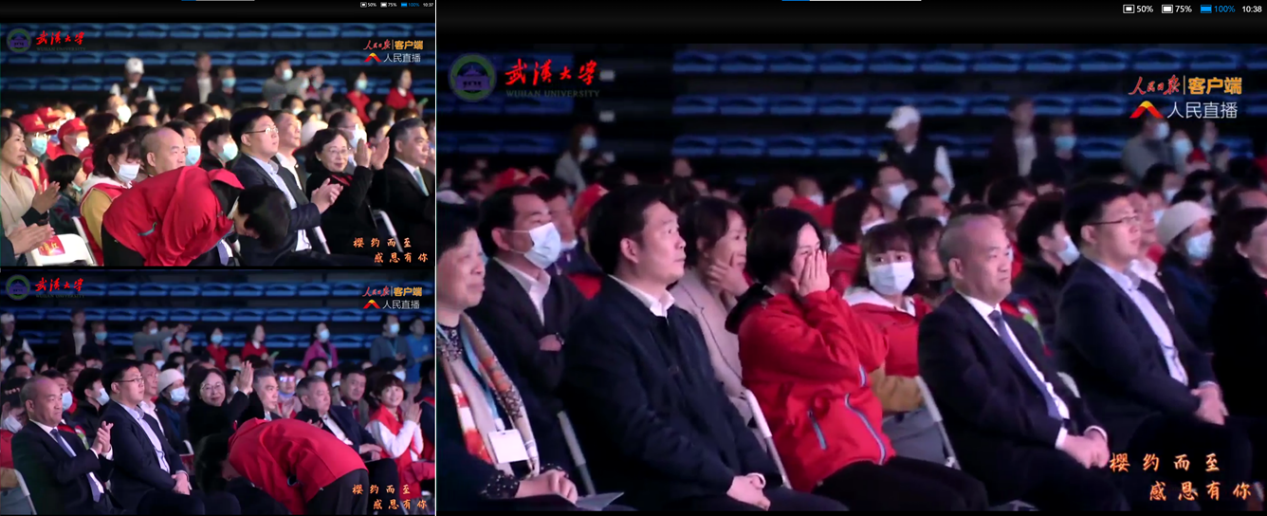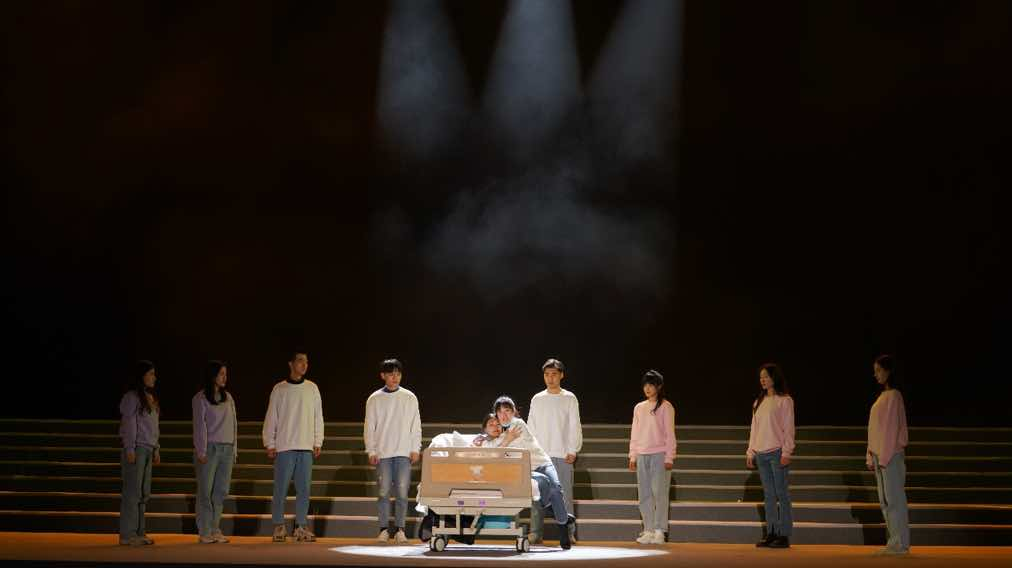On the evening of March 13th, an artistic performance themed “Meet with grateful hearts when the cherry blossoms bloom” was held at the Zall Stadium. The event was held as a sign of appreciation to the medical heroes for their contribution to the fight against COVID-19.
The grand show started at 19:00 with an outstanding performance of My Motherland, expressing WHUers’ deep love for their nation. In lending voice to the cherry blossoms, the original poem Appointment of Cherry Blossom praised the medical personnel’s dignity and kindness, and showed WHUers’ appreciation and respect for them. Through singing and dancing, Spring returned to Luojia Mountain once again.

Spring
Medical staff from Renmin Hospital and Zhongnan Hospital of WHU stepped onto the stage. With the song Fight Together against the Pandemic adapted from the famous military song When Your Hair Sweeps My Gun, medical staff from Renmin Hospital reproduced the scenes of fighting and eulogized their colleagues’ bravery and dedication.
With its lively melody, Listen to Me, Thank You immediately caught the audiences’ attention. It was performed by nurses from Zhongnan Hospital, who were on the frontline, with pupils from No. 2 Primary School attached to WHU, many of whose parents are medical workers. When waiting to go on stage, the kids were not nervous, but anticipated to show their love and thanks via their performance. A fourth-grader said, “We are proud. We are able to meet the heroes that we want to thank!”

Listen to Me, Thank You
A Beautiful Promise by the remarkable singer Prof. Liu Danli, Dean of WHU Art School, brought the show to a climax, making many audience members burst into tears. It was composed according to the widespread story of a nurse, Zhou Guohong.

A Beautiful Promise
Although worried about her own daughter Chen Yanran, Zhou Guohong left her hometown and came to Wuhan to fight against COVID-19 at the most critical time. As there was little time for communication, she left encouraging words for her daughter on the back of her protective clothing. After hearing about this, WHU’s President Dou Xiankang wrote a letter to Chen Yanran, saluting medical workers like her mother and encouraging her to realize her dream and study at WHU in the future.
Ms. Zhou was invited to enjoy the show seated in the front row beside President Dou. During the performance, she stood up many times, bowing to Prof. Liu and the audience with tears streaming down her face. “Personally, I don’t think I’m a hero. I’m just an ordinary person doing what I’m supposed to do. But Wuhan, Hubei and the whole society have given me too many heart-warming memories,” Zhou Guohong said faithfully.

Zhou Guohong (in red) breaking into tears
The play Go Home Together was adapted from a true story during the pandemic. A grandmother was afflicted with illness and could not eat anything. Her granddaughter worried her a lot and begged her to eat as much as possible. Accompanying her grandma, the girl recalled the happy times they spent together in her childhood, with her grandma taking her to the bank of the Yangtze River, combing her hair, etc. The famous balladeer, Wuhanese Feng Xiang’s folk songs penetrated the scene. The grandmother regained confidence to conquer the virus and promised the girl to go home together.

Go Home Together
The play ended with the song Love Makes Home, turning into a chorus and pushing the show to a grand climax. Everyone stood up and sang spontaneously and gratefully as the epilogue was performed.
“The show reveals my inner thoughts and feelings of the memories,” said a medical worker, “It really goes beyond my expectation for enjoying such a terrific performance given by WHU.”

The epilogue
This show was undertaken by WHU Art School and the Arts Education Center, and was directed by Prof. Liu and two young teachers, Wang Shan and Wu Jiegong. Other teachers from the Art School also played different roles and contributed generously to the show. Except for the above programs, they also added many of WHU’s, Wuhan’s and Hubei’s cultural characteristics into the show, such as original WHU campus songs, the Yellow Crane Tower, and Chu opera.
More than 300 members participated in the preparation of this show. In addition to more than 30 medical workers from the hospitals and over 90 teachers and pupils from the primary school, contributors included undergraduate and graduate students from over 20 colleges and over 50 majors of WHU. Only six days before the performance, the venue was changed from the Humanities Hall with around 400 seats to the Zall Stadium with over 3,000 seats due to the reservation data. Programs, stage design and construction changed correspondingly, and performers rehearsed day and night to present such a feast.
“Without the dedication to art, without the love to WHU, and without the respect for medical workers, they would not have made it,” said the general coordinator Li Tianliang, Vice Director of the WHU Party and Administration Office.
According to an introductory video, the date of performance, “13”, means “all one’s life” because of the similarity in the Chinese pronunciation of yi san (一三) and yi sheng (一生). WHU wants to present its sincerest gratitude towards medical staff who risked their individual safety to protect the big “family”, the city and the nation. The show has drawn its curtain, but the seed of love and gratitude to heroes will grow and flourish in WHUers’ heart. WHU will continue to fulfill its promise to invite these medical workers back to the campus for cherry blossom season for the next two years.
Photo by WHU Art School and Arts Education Center, Zou Pengzhi, People’s Daily
Edited by Wei Yena, Luo Yuanyuan